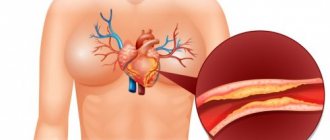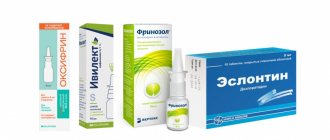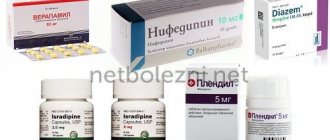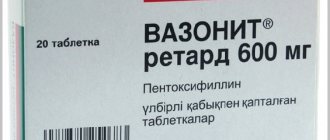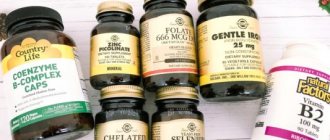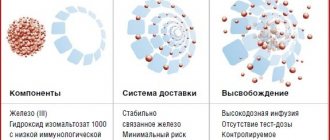Hemostatic (antihemorrhagic, hemostatic) drugs are a group of drugs that are used to stop bleeding (hemorrhages) and prevent excessive blood loss.
Normally, blood is a fluid liquid - a suspension of formed elements (erythrocytes, leukocytes, platelets) in plasma. However, during bleeding, blood is able to change its rheological (fluid) properties - it becomes excessively thick and viscous, and then solidifies at the site of damage to the vessel wall (coagulates), forming a clot (thrombus). The thrombus closes the lumen of the wound and thereby prevents further bleeding and loss of blood from the body.
In case of extensive bleeding or in diseases that are accompanied by a violation of the formation of blood clots, the blood does not have time or is not able to clot in time. This leads to excessive blood loss, and then to shock, oxygen starvation of organs (especially the brain and heart) and the development of various kinds of negative consequences, including death. In this case, hemostatic drugs are used.
What is bleeding hemorrhoids
Hemorrhoids are accompanied by pain and itching in the rectal area, and a sensation of a foreign body in the rectum. In advanced forms of the disease, bleeding develops. In the initial stages, a drop of blood from the patient may be detected after a bowel movement. But soon there may be profuse bleeding from the anus.
The main cause of this pathological condition is damage to the hemorrhoids due to constipation.
This pathological condition can be cured by using hemostatic drugs for hemorrhoids. They are produced mainly in the form of:
- rectal suppositories;
- drugs for oral administration;
- ointments for external use.
Let's consider the most effective means that belong to these groups.
Classification of hemostatic drugs
Hemostatic drugs are classified into:
- fibrinolysis inhibitors: amino acids (tranexamic acid, aminocaproic acid), protease inhibitors (aprotinin);
- vitamin K preparations: menadione, phytomenadione;
- herbal preparations: liquid extract of water pepper, nettle leaves, yarrow herb;
- hemostatic agents for local use: thrombin, fibrinogen, Ambien, calcium chloride;
- other hemostatic drugs for systemic use: etamsylate, eltrombopag, emicizumab, recombinant thrombopoietin.
In addition, preparations of proteins that regulate blood coagulation - coagulation factors II, VII, VIIa, VIII, IX, X and their combinations, von Willebrand factor, nonacog alpha - have a hemostatic effect.
Hemostatic tablets for hemorrhoids
For bleeding hemorrhoids, medications for internal use are prescribed. These include the following tablets:
- Chemoroidin,
- Detralex,
- Asklezan A,
- Pilex,
- Ginkor Fort,
- Etamzilat,
- Litovit-B,
- Dicynon,
- Vikasol.
Chemoroidin
Contains plant substances that act on the walls of the rectum. Prescribed when hemorrhoids bleed. Chemoroidin has the following effects on the body:
- reduces inflammation in the anus;
- stops bleeding;
- eliminates burning and itching in the anus;
- With long-term use, it reduces the size of knots.
Detralex
Detralex is an effective tablet for hemorrhoids. Most often used for blood pathologies.
The active substances of the medicine relieve swelling in the anus and pain
This drug increases venous tone and restores blood supply. Thanks to these properties, bleeding stops.
Asklezan A
The drug is classified as a dietary supplement. Helps with acute hemorrhoids. Used for mild bleeding from anal fissures.
Pylex
The drug is based on herbal substances that help eliminate inflammation of the rectum, stop bleeding, and reduce burning and itching in the rectal area.
For the greatest therapeutic effect, it is necessary to use the tablets simultaneously with other drugs for hemorrhoids (medicines for topical use).
Ginkor Fort
Prescribed for minor hemorrhoidal bleeding. The pharmacological properties of the tablets include:
- normalization of venous tone;
- relieving pain in the anus;
- blood thinning;
- restoration of normal blood supply;
- preventing blood clots;
- increasing the permeability of the capillary system.
Litovit B is a safe dietary supplement that helps women cope with hemorrhoids during pregnancy
Litovit-B
The tablets contain herbal ingredients that help eliminate the symptoms of the pathological condition. Most often prescribed for hemorrhoids for women during pregnancy.
The substances that make up the drug stop the development of the disease and promote the healing of affected tissues in the rectal area. In addition, the tablets normalize the functioning of the intestines.
Etamsylate, Dicynon and Vikasol are used for emergency treatment of severe internal bleeding. In addition to tablets, drugs are also available in the form of injection solutions.
It is important to remember that such medications may have restrictions on their use and cause side effects. Therefore, self-medication for illness is strictly prohibited. Only the attending physician prescribes tablets for hemorrhoids with bleeding.
Effective rectal suppositories for bleeding
To treat hemorrhoids that bleed, suppositories are used. These drugs not only reduce bleeding, but also eliminate other signs of pathology. Suppositories stimulate regeneration processes and eliminate pain in the anus. Rectal suppositories are commonly used to treat internal hemorrhoids.
The peculiarity of these suppositories is that at normal room temperature they will not melt, however, when they are introduced into the rectum, a rapid effect is observed, especially with severe bleeding.
The following drugs effectively help with hemorrhoids during bleeding:
- Anuzol;
- Methyluracil;
- suppositories with propolis;
- Hepatrombin;
- suppositories with adrenaline;
- Relief (Relief Advance or Relief-ultra);
- homeopathic suppositories.
Anuzol
The drug contains bismuth, zinc and belladonna extract.
The product effectively helps if hemorrhoids are bleeding. Anuzol relieves pain and has a hemostatic effect. In addition, it reduces the inflammatory process in the rectum and eliminates burning and itching sensations.
Methyluracil suppositories
This medicine for hemorrhoids treats wounds and fissures of the anus, helps reduce bleeding from hemorrhoids. Restores damaged tissue and protects against pathogenic bacteria. Excellent for heavy bleeding from the anus.
Side effects may rarely occur when using methyluracil suppositories.
Suppositories with propolis
Propolis, which is part of the drug, increases blood clotting, as a result of which bleeding stops. The drug fights inflammation of the rectum and stops the growth and reproduction of pathogens in the anus. It is recommended to insert one candle into the anus before bed every day.
The use of propolis-based suppositories is permitted during pregnancy and lactation.
Ready-made suppositories can be purchased at any pharmaceutical establishment. In addition, such candles can be prepared at home. To do this, simmer Vaseline and cocoa butter in a water bath, and add propolis to the mixture. Then the product is poured into foil forms and frozen in the refrigerator.
Hepatrombin
Candles contain the following active ingredients:
- heparin;
- allantoin;
- lemon oil;
- dexpanthenol, a B vitamin;
- pine oil.
Thanks to the pharmacological properties of these substances, bleeding quickly stops and swelling in the anal area is relieved. In addition, the product prevents blood clots.
At the local level, under the influence of suppositories, blood supply and metabolic processes improve. Candles allow you to speed up the recovery of damaged tissue.
Adrenaline suppositories
The active component stops blood in the rectum, due to its ability to increase blood clotting.
These candles have some restrictions on their use. An adverse reaction of the drug is an increase in blood pressure. Therefore, it is not recommended to use the medicine to treat hemorrhoids in elderly patients.
Effective ointments for bleeding hemorrhoids
When treating hemorrhoids with bleeding, I also use ointments, gels and creams. The following are considered effective in this regard:
- Fleming's ointment. It is a homeopathic remedy. Therefore, use does not depend on age criteria and other characteristics of the body. This remedy can be used even during pregnancy.
- Relief Advance. The ointment contains shark liver oil, which has a wound-healing effect and reduces the inflammatory process in the lesion. The ointment contains phenylephrine hydrochloride, which constricts the vessels of the rectum and eliminates bleeding in it.
- Hepatrombin. The active ingredient is heparin, which prevents blood from clotting quickly. Therefore, the ointment not only reduces bleeding, but also prevents the formation of blood clots. The medicine eliminates swelling and relieves inflammation of the walls of the rectum.
- Proctosan. The ointment contains bismuth, which treats maceration of the skin and relieves pain.
- Heparin ointment. Heparin contained in the product has hemostatic and anti-inflammatory properties.
- Troxevasin. The main properties of the gel are considered to reduce venous permeability, reduce inflammation and improve blood circulation. Proctologists recommend the simultaneous use of Troxevasin gel and tablets.
- Bezornil. Helps with various complications of hemorrhoids, including bleeding.
- Proctoglivenol. The ointment is used for external hemorrhoids. It has an anti-inflammatory, hemostatic, softening and analgesic effect on hemorrhoids and fissures. Also available in the form of rectal suppositories.
- Boro Derm. Herbal preparation. Its main action is aimed at relieving pain and discomfort in the rectal area. Eucalyptus extract has antiseptic properties, and horse chestnut perfectly strengthens blood vessels and stops bleeding.
- Aurobin. Thanks to the vitamins contained in the preparation, wounds and cracks heal faster.
- Berzonil. Use ointment to treat chronic hemorrhoids.
- Vishnevsky ointment. Helps with external manifestations of the disease. It is recommended to apply compresses with this remedy to the affected area.
These ointments are applied to damaged areas several times a day. In addition, compresses can be made using these products. Before doing this, it is recommended to wash the rectal area with baby soap.
Indications for use
Hemostatic drugs are used for conditions associated with blood clotting disorders and bleeding.
Fibrinolysis inhibitors are used to stop severe bleeding during operations (especially on the heart, lungs, large vessels), extensive injuries, birth hemorrhages, reduced blood clotting in liver diseases, as well as in case of overdose of fibrinolytic drugs (fibrinolysin, streptokinase, alteplase, urokinase, tenecteplase and etc.).
Aprotinin is additionally used for diseases of the pancreas: acute pancreatitis (including alcoholic), severe injuries and pancreatic cancer.
Vitamin K preparations are used for bleeding associated with vitamin K deficiency in the body: hemorrhagic syndrome of newborns, liver diseases (cholelithiasis and obstructive jaundice) and intestinal diseases (enterocolitis, Crohn's disease). In addition, vitamin K preparations are used for bleeding caused by an overdose of indirect anticoagulants - warfarin, acenocoumarol, phenindione.
Herbal hemostatics are indicated for uterine bleeding (menorrhagia), minor bleeding from small vessels of the stomach and intestines.
Hemostatic drugs for local use are used to stop capillary and parenchymal bleeding (from internal organs) during open abdominal operations.
Etamsylate is used for the prevention and treatment of surgical bleeding, as well as for uterine, nosebleeds, bleeding gums due to periodontal disease, and gingivitis.
Eltrombopag and recombinant thrombopoietin are indicated for the treatment of idiopathic thrombocytopenic purpura - a chronically low level of platelets in the blood, which is dangerous due to frequent bleeding - when the spleen is removed.
Emicizumab is used to treat hemophilia, an inherited disease associated with blood clotting disorders and life-threatening bleeding.
Clotting factor drugs are used for severe, extensive bleeding, as well as for the treatment of hemophilia.
Other means
Microlax, which is available in a solution for rectal administration using microenemas, will help cure hemorrhoids that are bleeding.
This drug is a combination drug that has a laxative effect. The components included in the medicine help soften stool during constipation, which often causes bleeding.
In addition, Microlax affects the receptors of the intestinal mucosa, as a result of which peristalsis is stimulated. Thanks to this action, bowel movements are improved.
Thus, there is a large selection of pharmaceutical agents for the treatment of internal or external bleeding due to hemorrhoids. They are available in the form of tablets, injection solutions, microenemas, ointments, creams and rectal suppositories.
However, it is important to remember that some of them have adverse reactions or may be contraindicated in various conditions. Therefore, it is necessary that such drugs be prescribed by a qualified specialist.
Treatment of bleeding from hemorrhoids
Bleeding is just a symptom. Therefore, treatment should be aimed at eliminating the underlying cause causing the bleeding.
Only on the basis of competent diagnostic data can a specialist prescribe the correct treatment for hemorrhoids. If we are talking about the initial stages, then usually the therapeutic complex includes a special intestinal-friendly diet, vitamin supplements, and recommendations for preventive measures. The main treatment for bleeding from hemorrhoids and other symptoms is associated with the use of medications.
Modern antihemorrhoidal drugs are usually available in the form of suppositories and creams for topical use. A targeted impact on the source of pathology gives positive results.
